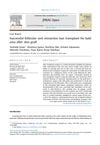November 2024 in “Journal of Functional Foods” AP collagen peptides improve hair elasticity and gloss.
 January 2024 in “Molecules (Basel. Online)”
January 2024 in “Molecules (Basel. Online)” Juglone from walnut extracts may help repair damaged hair.
[object Object] 12 citations,
October 2018 in “Biotechnology reports” Recombinant keratin K31 makes damaged hair thicker, stronger, and straighter.
 December 2021 in “Dermatology research”
December 2021 in “Dermatology research” Low levels of vitamin B12, ferritin, and calcium are linked to premature graying of hair.
 July 2024 in “Journal of Cosmetic Dermatology”
July 2024 in “Journal of Cosmetic Dermatology” Vegan collagen builder improves hair growth, skin smoothness, and reduces wrinkles and pain.
 December 1920 in “The Lancet”
December 1920 in “The Lancet” The document discusses various public health initiatives and societal issues, emphasizing early intervention and support.
 April 2020 in “JOJ dermatology & cosmetics”
April 2020 in “JOJ dermatology & cosmetics” New eyebrow transplant method from Taiwan gives good results without lasers or tattoos.
 November 2021 in “Dermatology Research and Practice”
November 2021 in “Dermatology Research and Practice” The study aims to understand the skin and hair characteristics of mothers and their babies, and how these may affect newborns' skin health and mothers' postpartum hair loss.
188 citations,
June 1998 in “Molecular cell” Researchers created a mouse with the same mutation as humans with trichothiodystrophy, showing similar symptoms and confirming the condition is due to defects in DNA repair and gene activity.
 11 citations,
July 2020 in “Journal of Cosmetic Dermatology”
11 citations,
July 2020 in “Journal of Cosmetic Dermatology” Sandalore® improves hair growth and quality in people with hair loss.
3 citations,
September 2021 in “Data in brief” Bleaching hair changes its structure and weakens it, which is important for understanding hair damage and creating treatments.
December 2023 in “Journal of clinical medicine” Some leukemia treatments can cause skin reactions similar to keratosis pilaris.
 3 citations,
May 2021 in “Molecules”
3 citations,
May 2021 in “Molecules” Rosuvastatin improves lipid levels, reduces inflammation, but worsens insulin sensitivity in men with early-onset hair loss.
85 citations,
January 2018 in “Cell stem cell” Different signals work together to change gene activity and guide hair follicle stem cells to become specific cell types.
 88 citations,
July 2019 in “International Journal of Molecular Sciences”
88 citations,
July 2019 in “International Journal of Molecular Sciences” Using human fat tissue derived stem cells in micrografts can safely and effectively increase hair density in people with hair loss.
375 citations,
June 2013 in “Biochimica et biophysica acta. Molecular cell research” Cornification is how skin cells die to form the protective outer layer of skin, hair, and nails.
 30 citations,
January 2023 in “EFSA journal”
30 citations,
January 2023 in “EFSA journal” Adults should not consume more than 255 micrograms of selenium per day to avoid risk of hair loss and other side effects.
 June 2017 in “JPRAS Open”
June 2017 in “JPRAS Open” Hair transplant was successful on a bald area after skin graft surgery.
 October 2023 in “Cognizance journal”
October 2023 in “Cognizance journal” The document suggests using natural remedies like bloodletting and honey for various health issues but lacks scientific evidence for their effectiveness.

Hair analysis can help identify specific minerals and amino acids linked to various diseases.
 2 citations,
December 2021 in “International Journal of Andrology”
2 citations,
December 2021 in “International Journal of Andrology” Most legal cases about 5α-reductase inhibitors, drugs for hair loss and prostate issues, complain about side effects and delayed cancer diagnosis, with most lawsuits settled out of court.
 December 2011 in “Asia-Pacific biotech news”
December 2011 in “Asia-Pacific biotech news” In 2011, there were major scientific breakthroughs in cancer treatment, immunity, Parkinson's, virus simulation, schizophrenia, hair growth, lung cancer, and medical grafts.
 December 2022 in “International Research Journal Of Modernization In Engineering Technology And Science”
December 2022 in “International Research Journal Of Modernization In Engineering Technology And Science” Cosmeceuticals are special products that improve skin and hair health and have benefits like treating acne and wrinkles, protecting from the sun, and helping with dandruff and hair growth.
 January 2025 in “International Journal of Women’s Dermatology”
January 2025 in “International Journal of Women’s Dermatology” Dermatologists need better training on ethnic hair care to improve patient care and satisfaction.
[object Object]  10 citations,
May 2012 in “PloS one”
10 citations,
May 2012 in “PloS one” Low ERCC3 gene activity is linked to non-pigmented hair growth.
 25 citations,
November 2015 in “Journal of Ethnopharmacology”
25 citations,
November 2015 in “Journal of Ethnopharmacology” Certain Chinese herbs, especially Cacumen platycladi, can promote hair regrowth and reduce hair loss-related hormone levels in mice.
 419 citations,
January 2015 in “Journal of Consumer Research”
419 citations,
January 2015 in “Journal of Consumer Research” Corporate social responsibility can improve consumer ratings of product performance, especially when the company is seen as benevolent and consumers aren't experts on the product.
 2 citations,
November 2021 in “Frontiers in Medicine”
2 citations,
November 2021 in “Frontiers in Medicine” New skin imaging, teledermatology, and AI could become key in future dermatology care.
 67 citations,
June 2018 in “Engineering in Life Sciences”
67 citations,
June 2018 in “Engineering in Life Sciences” Plant cell culture is a promising method for creating sustainable and high-quality cosmetic ingredients.
 2 citations,
October 2022 in “International journal of Ayurvedic medicine”
2 citations,
October 2022 in “International journal of Ayurvedic medicine” Licorice has many traditional health benefits, but more research is needed to fully support these claims.






















